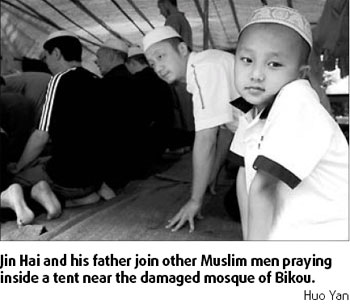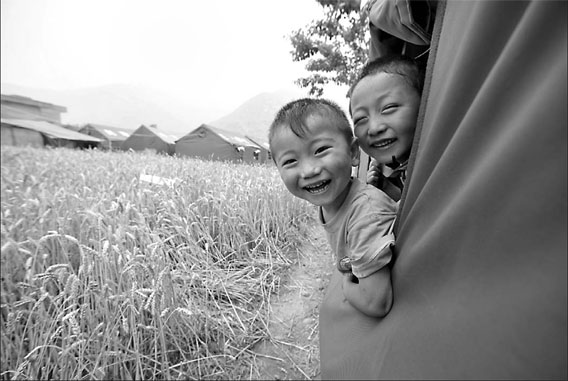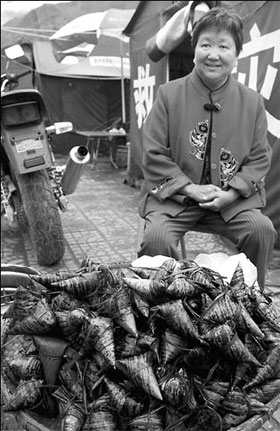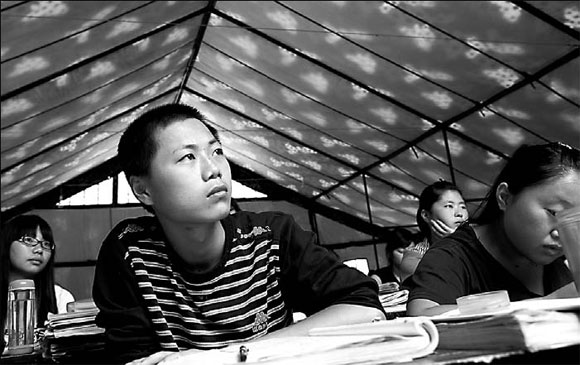Life goes on in post-quake Bikou
|
Children laugh in a donated tent at Yaojiaping village, Bikou town of Northwest China's Gansu province. Jiang Shenglian |
BIKOU, Gansu: Gansu province's southernmost town of Bikou, just 200 km from the Wenchuan county epicenter of the May 12 earthquake, continues to be affected by aftershocks.
The quake flattened 90 percent of Bikou's houses, and those left standing sustained serious interior damage.
Three weeks after the earthquake, Bikou's 22,000 residents are still being jolted by terrifying aftershocks as they try to resume normal lives.
It is 7 am on Saturday, a day before the traditional Dragon Boat Festival. Zhang Zhenfang, 58, emerges from her tent carrying a basket of cucumbers. It is another rainy day.
Fissures have ripped up the town's main street. On one side stand the ruins and dismal debris of quake-ravaged homes; on the other by the Bailong River, are rows of blue tents that provide residents with temporary shelter.
|
Wang Bingcheng sells homemade zongzi, a pyramid-shaped desert for the Dragon Boat Festival, in front of her tent-home in Bikou, Saturday. Huo Yan |
Zhang was out in the fields on the nearby mountainside gathering cucumbers and grapes when the earthquake struck.
"I tried to run down to the town, but the quake tremors threw me to the ground," Zhang says, shivering at the memory of the dreadful moment.
Grabbing a handful of earth and shaking it through her fingers to demonstrate, she says: "The ground just shook as though it were being sieved, I thought the whole mountain was about to collapse."
When Zhang finally returned home, she found that all three of her houses had collapsed - one of them was more than 100 years old and the other two had recently been built with her family's life savings.
Zhang and her eight family members now live in two tents they received on May 21. Many other residents of Bikou have also received tents, but there are still not enough to shelter the town's newly homeless.
Situated downstream of Bailong River, Bikou was formerly a busy merchant shipping wharf.
Boats set sail from Bikou dock to the Jialing River, where they then head for Chongqing and Shanghai.
This picturesque town is rich in gold and jade deposits. Bikou locals have also planted tea, rice, wheat, fruit and vegetables in the area for its future generations.
A few days before the quake, a tea festival was held in the town to celebrate this year's harvest.
Zhang makes her way to the temporary market on the banks of the river. Many other town dwellers are there, shopping for zongzi, the pyramid-shaped packets of glutinous rice wrapped in reed or bamboo leaves. Every family eats them to celebrate the Dragon Boat festival.
The fragrance of 60-year-old Wang Bingcheng's homemade zongzi draws crowds of shoppers to her market stall.
"I don't want to break my custom of making zongzi. No matter what happens, our life must go on," says Wang, who lives with seven family members in a tent.

Jin Hongliang, a 31-year-old barber, is giving a haircut to one of the town's senior citizens in the tent that is now an improvised barbershop.
"The situation is much worse than I thought, but we can't just sit and wait for help, we must do our best to see to ourselves," Jin says.
"My daily custom - about 20 heads a day - is about the same as before the quake," Jin reckons.
Jin and three other barbers have given free haircuts to the 400 soldiers stationed at the dock, where relief work is being carried out.
At 1:30 pm, Ma Weihua, the imam of Bikou's Muslim mosque, leads around 40 Muslims in prayer in the large tent near the damaged mosque.
More than 400 Muslims live in Bikou, most of whom migrated from Sichuan over the past decades.
The mosque in Bikou, built in 2001, was the only one in Wenxian county. Hundreds of Muslims from other areas of Wenxian gather for prayer each Friday and the Eid-al Fitr festival.
Most of the ceiling of the two-story building where Ma and 39 other Muslim families lived, was destroyed in the quake. Rubble blocks its doorways.

Bikou Muslims also live in relief tents, provided by Muslims in other towns and the local government.
"The situation is getting much better. We now have enough food and clean water," says Ma but adding more help is needed to rebuild the mosque.
"Towards the end of each prayer, we fold our hands and pray to Allah to help us recover quickly from this monstrous earthquake, and for the safety and renewed wellbeing of people of all ethnic groups in our country," says Ma.
Jin Hui, 33, another Muslim, lives with his 14 family members in two tents near the main street.
The construction equipment store he runs suffered huge losses in the quake. Electronic devices worth 30,000 yuan ($4,300) were completely destroyed when his store collapsed.
But as he fondly observes his 5-year-old son tucking in to a bowl of porridge and cakes, Jin seems confident about the future. "As long as I continue to work hard, life is bound to get better before too long."
At 3 pm, another aftershock strikes Bikou. But, Shen Maoxiao, a Datang Hydro Power Plant official, remains calm, as though nothing had even happened.
The power plant, situated 10 km from the town, has an 101.8-m high dam made of earth and stone. When completed in 1976, it was the tallest of its kind in Asia.
The power plant has three sets of generators that transmit 1 billion kw/hr electricity annually to Gansu, Sichuan and Shaanxi.

A transformer and an arrester were damaged in the quake, Shen says grimly. Despite the real threat of aftershocks, an emergency team repaired both on the night of May 12.
Experts from the State Electricity Regulatory Commission inspected the plant on May 24 and confirmed its safety.
The power plant has been working at full swing supplying electricity to the worst-hit areas in Sichuan and Gansu.
At 4:30 pm, Grade 3 senior high school students are in their temporary classroom, which consists of two large tents provided by soldiers from Lanzhou, provincial capital of Gansu. These students were transferred to a village named Doujiaba, about 10 km from Bikou, two weeks after the quake.
Soldiers and teachers have been taking care of the students round-the-clock, preparing three meals a day and encouraging them not to succumb to pressure.
As students in other parts of the country take part in the national college entrance exam, the quake-affected students are left wondering when and where they will take the exam.
"We have got used to the aftershocks, our main worry now is the exam," says Cao Weijia, a student in the science class.
"Most students are focused on the exam, which is most likely to be held at the beginning of July," says physics teacher Du Yulin.
"The good news is that our students will have an equal opportunity, as colleges have specified a quota for those qualified," says Du.
At 6 pm, a group of volunteers distributes aid materials among villagers in Weigou, 40 km from Bikou and one of the worst-hit mountain villages. The quake flattened every single home of the village's 200 residents, and the narrow and muddy mountain track to the village seriously impedes accessibility.
Volunteers, wearing yellow shirts printed with the characters for "love harmonies," comprise of teachers, business people, doctors and college students from Lanzhou.

They bought relief goods and drove to Bikou as soon as they heard about the damage suffered in the quake by the stricken mountain village .
"I think everybody affected by the quake needs help," says businessman Wang Xinjun, as he hands out medicines to villagers standing in front of the ruins of a house.
At the foot of the mountain, another group of yellow T-shirt volunteers play games with local children by the river.
The rain, which lasted a whole day, has finally stopped. Rays of golden sunlight penetrate the gloomy clouds, brightening the green mountains and illuminating their reflection in the Bailong River.
"When we first saw the kids, they were silent and not smiling," says Yang Jinshun, manager at a Lanzhou company. "But, disaster should not deprive these innocent children of their capacity to smile and play. We want to help them forget their nightmare."
|
Li Wei and other high school students continue their studies in a tent school, preparing for the postponed college entrance exam on June 7. Huo Yan |
(China Daily 06/10/2008 page20)

















